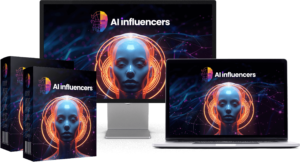The Emergence of AI Influencers: Revolutionizing Digital Marketing

In today’s fast-paced digital marketing landscape, artificial intelligence (AI) is fundamentally transforming how brands connect with consumers. Among the most groundbreaking advancements in this sphere is the rise of AI influencers. These hyper-realistic digital personas are not just a fleeting trend; they signify a major shift in how brands interact with their audiences. As an affiliate marketer, grasping the potential of AI influencers can empower you to create engaging content that resonates with your target audience and drives conversions. This article explores what AI influencers are, their benefits, the ways they are reshaping marketing strategies and effective methods for promoting them.
What Are AI Influencers?
AI influencers are computer-generated characters designed to imitate human behaviors, appearances, and emotions. Developed using sophisticated algorithms and cutting-edge graphics technology, these digital avatars can appear strikingly lifelike. Unlike traditional influencers, who draw on real-life experiences and personalities, AI influencers are programmed to engage audiences across various social media platforms, generate content, and collaborate with brands.
Key Features of AI Influencers
- Lifelike Appearance: The latest advancements in AI and CGI (computer-generated imagery) have made it possible to create hyper-realistic digital avatars. These influencers can be crafted to look nearly indistinguishable from real humans, complete with authentic expressions and movements.
- Constant Availability: AI influencers don’t require rest or breaks. They can maintain a continuous online presence, interact with followers, and produce content at any hour, ensuring that brands stay relevant and engaged with their audience.
- Data-Driven Engagement: AI influencers are capable of analyzing vast amounts of audience data to tailor their content. This enables them to create personalized experiences that resonate deeply with followers, ultimately leading to higher engagement rates.
- Cost-Effectiveness: Engaging traditional influencers can be pricey, especially those with large followings. AI influencers present a more budget-friendly alternative, allowing brands to engage audiences without incurring significant expenses.
- Content Versatility: AI influencers can operate across multiple platforms, from Instagram and TikTok to YouTube, and can produce various types of content, including images, videos, and blog posts.
The Advantages of Using AI Influencers in Marketing
1. Strengthened Brand Identity
One of the primary benefits of AI influencers is their ability to embody specific brand values and aesthetics. Brands can design AI influencers to reflect their identity, ensuring a seamless integration of marketing messages. This consistency enhances brand loyalty and resonates with target audiences.
2. Higher Engagement Rates
AI influencers can interact with followers in real time, fostering stronger relationships and creating a sense of community. Their consistent engagement leads to elevated interaction rates, which are crucial for successful marketing campaigns. Brands can leverage this to build trust and loyalty among consumers.
3. Precision Targeting in Marketing Campaigns
AI influencers possess the capability to analyze audience behavior and preferences. This data-driven approach allows brands to craft targeted marketing campaigns that reach the right people with the right messages. By understanding consumer behavior, brands can optimize their strategies for maximum effectiveness.
4. Diverse Content Creation
AI influencers can generate a wide array of content formats, from videos and podcasts to social media posts and articles. This versatility enables brands to maintain a rich content strategy, ensuring they can engage audiences across different platforms and formats.
5. Cost-Effective Solutions
For startups and small businesses, hiring traditional influencers can be prohibitively expensive. AI influencers offer a cost-effective alternative, allowing brands to connect with audiences without exceeding their budgets. This makes them an attractive option for businesses aiming to maximize their marketing investments.
6. Minimization of Human Error influencers can sometimes misrepresent brands or make errors that lead to negative publicity. AI influencers, being programmed, can be designed to align perfectly with a brand’s messaging, minimizing the risk of miscommunication. This ensures that the brand’s image remains intact.
How AI Influencers Are Transforming Marketing Strategies
The integration of AI influencers into marketing strategies is reshaping how brands approach their digital marketing efforts. Here are some key ways AI influencers are changing the game:
1. Authenticity and Relatability
While AI influencers are not real, they can be crafted to embody traits that consumers find relatable. This unique blend of authenticity and fantasy allows brands to engage with consumers on an emotional level. By developing narratives around AI influencers that resonate with audiences, brands can forge deeper connections.
2. Data-Driven Decision Making
AI influencers’ ability to process and analyze data leads to more informed marketing decisions. Brands can utilize insights gained from AI analytics to refine their strategies, ensuring they meet the needs and preferences of their target audience. This data-driven approach enhances the effectiveness of marketing campaigns.
3. Expanded Reach
AI influencers can operate across multiple platforms simultaneously, allowing brands to broaden their reach. Traditional influencers may have a limited audience based on their specific platform, but AI influencers can tap into diverse demographics and markets, increasing overall brand visibility.
4. Innovative Campaigns
The creative possibilities with AI influencers are virtually limitless. Brands can experiment with innovative marketing campaigns that blend technology with storytelling. For instance, AI influencers can participate in virtual events, host interactive Q&A sessions, or collaborate with other digital personas in unique ways.
5. Building Trust and Credibility
By consistently delivering value and engaging with followers, AI influencers can help build trust and credibility for brands. As consumers become more discerning, having a relatable and reliable AI influencer can enhance a brand’s reputation and foster loyalty.
Best Practices for Promoting AI Influencers
To effectively promote AI influencers as an affiliate marketer, a strategic approach is essential. Here are some best practices to consider:
1. Create Informative and Engaging Content
One of the most effective ways to promote AI influencers is through informative and engaging content. Write articles, blog posts, or social media updates that explain the benefits and functionalities of AI influencers. Utilize case studies and examples to illustrate their effectiveness in marketing. Highlight how brands have successfully leveraged AI influencers to drive engagement and sales.
2. Utilize Social Media Platforms
Social media serves as a powerful tool for promoting AI influencers. Share compelling visuals and engaging content featuring AI influencers on platforms like Instagram, Facebook, Twitter, and TikTok. Use relevant hashtags to reach a wider audience and encourage sharing. Creating visually appealing posts that showcase the uniqueness of AI influencers can capture attention and generate interest.
3. Collaborate with Brands
Partnering with brands that are utilizing AI influencers can enhance your credibility as an affiliate marketer. Offer to create content that highlights the success of these collaborations. This could include reviews, testimonials, or case studies that showcase how AI influencers have positively impacted brand campaigns.
4. Leverage Video Marketing
Video content is highly engaging and can effectively showcase AI influencers in action. Create explainer videos that demonstrate how AI influencers work and their impact on marketing. Use storytelling techniques to highlight the journey of an AI influencer and how they connect with audiences. Sharing these videos on platforms like YouTube can broaden your reach.
5. Engage Your Audience
Encourage discussions around AI influencers on your social media channels. Ask your followers what they think about this trend and how they see it influencing the future of marketing. Engaging with your audience not only builds relationships but also helps you understand their preferences and interests.
6. Monitor and Analyze Performance
As with any marketing strategy, it’s essential to monitor and analyze the performance of your promotions. Utilize analytics tools to track engagement metrics, click-through rates, and conversion rates. This data can help you refine your strategy, ensuring you effectively promote AI influencers and maximize your affiliate marketing efforts.
7. Stay Updated on Trends
The field of AI and digital marketing is constantly evolving. Stay informed about the latest trends, technologies, and consumer behaviors related to AI influencers. This knowledge will enable you to adapt your strategies and remain competitive in a dynamic landscape.
Conclusion
AI influencers are not just a fleeting trend; they are reshaping the digital marketing landscape in significant ways. As an affiliate marketer, promoting AI influencers can open up new avenues for engagement, creativity, and revenue. By understanding their benefits, leveraging data-driven insights, and implementing effective marketing strategies, you can establish yourself as a thought leader in this innovative space.
Embrace the future of marketing by integrating AI influencers into your strategies today. Whether through informative content, engaging social media posts, or innovative collaborations, the opportunities are vast. As AI technology continues to advance, the potential for AI influencers to transform marketing will only grow, making it an exciting time to be involved in this dynamic field. With the right approach, you can harness the power of AI influencers to elevate your marketing efforts and achieve lasting success.




